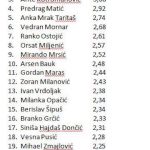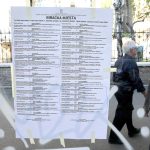May the 26th, 2023 – This week in Croatian politics, we’ve had visits from American generals and military exercises carried out in Udbina, drama surrounding the amendments to the Law on Constituencies, Plenkovic’s reforms have been dragged by those in economic circles and the infamous topic of property tax has once again reared its ugly head.
Croatian Defense Minister Mario Banozic meets with American Armed Forces General Christopher Gerard Cavoli
Banozic and Cavoli have met before the upcoming NATO summit in July, coming together to discuss Europe’s overall security situation and emphasise how joint exercises are an indication of the importance of NATO. Cavoli is not only a United States Army General, but has also served as the commander of United States European Command since the 1st of July 2022 and as Supreme Allied Commander Europe since the 4th of July 2022. Cavoli has been on a two-day working visit to the country as part of some international military exercises in Udbina which are being carried out under the organisation of US commands.
The NATO summit in the Lithuanian capital city of Vilnius in July was a hot topic for the pair, and Banozic made sure to thank the US General for all that has been done in terms of support, training and more for the Croatian Army recently. US efforts extended towards the Croatian Armed Forces also include modernisation and joint exercises. He also touched on the friendship and partnership of the USA and Croatia, emphasising the need to continue as we go forward with strong bilateral relations, especially in terms of defense.
“The joint training of allied forces like what is currently taking place here in Croatia is one of the best indicators of NATO’s significance, as it simultaneously improves capabilities, develops the interoperability of allied forces and sends out a firm a message of togetherness, cohesion and unity,” said Banozic according to a statement issued by the Ministry of Defense.
That same statement noted that the Republic of Croatia has made many steps forward and put in a lot of effort in terms of continuing to modernise its army, from the procurement of military aircraft to the implementation of all kinds of joint decisions, which is something he assured would continue in the future as well.
“Croatia is currently participating in thirteen different missions, operations and activities. For us, the security and stability of Southeast Europe is extremely important, which is why Croatia will continue to participate in KFOR. It will also continue to support the processes of Euro-Atlantic integration of the countries of Southeastern Europe,” Banozic explained.
New Croatian constituencies/electoral units have been presented, and drama has ensued
Prime Minister Andrej Plenkovic has officially presented the amendments to the Law on Constituencies, and people are unhappy about it for more than a few reasons, as is always the case in Croatian politics. There are now 10 constituencies that will elect 14 representatives each, and about 80 percent of voters have remained in their same/original constituencies. The City of Zagreb will now consist of three constituencies instead of four, and this is the most important change, at least according to Plenkovic.
“A minor modification”
Presenting the amendments to the Law on Constituencies, Plenkovic emphasised that this is only a minor modification of the existing map of Croatian constituencies, whereby only 22 percent of voters will see a change to the constituencies they’ve been until now.
The new law should enter into force on October the 1st, 2023
Amendments to the law in the first parliamentary reading will be sent before the summer break, so that the second reading would take place after the summer break is over, i.e. in the first two weeks of September, and the law would enter into force on October the 1st, since at the end of September, based on the decision of the Constitutional court, the current Law will cease to be valid.
Referring to the decision of the Constitutional Court of February the 7th, 2023, Plenkovic said that changes in the law should ensure the ”equal weighting” of the vote, that electoral units follow administrative boundaries as much as possible (counties, municipalities, cities) and that there should be no deviations in the number of voters per individual electoral unit to be greater than plus or minus five percent.
“We did want to keep the existing model”
“In the political sense, as a government, we wanted to achieve a situation in which we’d keep the existing model of 10 constituencies in which 14 representatives are elected. So, the Constitutional Court gave us the opportunity to, based on what they said, practically modify the existing system and to achieve equality, the equal treatment of both voters and representatives who are elected to the Croatian Parliament,” he said.
78 percent of voters will remain in the same constituencies they’ve always been in
In order to argue the claim that only minor modifications are being made, Plenkovic stated that as many as 78 percent of voters, or four fifths of the total number, will remain in the constituencies where they are currently and always have been in. He also stated that based on the proposed changes to the layout of the country’s constituencies, the largest deviation from the average number of voters per constituency (364,664) will amount to only 2.2 percent in the Xth constituency, and everything else will simply fall within 2.20 percent.
“These are extremely small deviations, which completely put the new ”architecture of constituencies” into the legal context of what is currently prescribed, which is plus or minus five percent. So, this is the closest to having practically an equal number of voters per constituency, which, of course, is impossible,” he said.
Journalists were naturally waiting to pounce with their lists of valid questions, and one of the most pressing of all is just how it could ever be possible that there are so many voters, because apparently there seems to be more voters than Croatian citizens who can vote.
”The register of voters is formed based on the records of residence and registries located in the ministries. It’s a register that changes daily. Elections are conducted based on the list of voters,” was the simple and quite frankly vague answer, especially given the fact that there have been endless attempts to solve the issue of ”fake residences” being registered across the country.
One might ask if this sort of voter list is at all credible, and HDZ believes it is:
”We believe that the information in it is credible. I don’t want to get into the debate about the population census. We took the voter register here, not the population census. The voter register is the basis for the electoral law,” stated Plenkovic.
The drama surrounding this topic is ongoing, with individuals from Croatian politics in Istria, Petrinja and even the island of Pag complaining about where they’ve found themselves after this constituency shakeup of sorts. We’re sure that this is a debate that will keep on being revisited and picked apart, as is the norm in the world of Croatian politics.
Croatian economist Damir Novotny says that recent reforms aren’t actually reforms at all, and that this sort of wage growth will only encourage inflation
Economist Damir Novotny appeared on N1 television where he commented on the tax reform that Prime Minister Andrej Plenkovic and Finance Minister Marko Primorac presented to the public recently. According to what the government presented on Wednesday, the lowest wages could increase by 40 euros on average. And what about everyone else?
“It’s not about reform, and this was also acknowledged by Primorac, who said that it’s about changing tax rates,” explained Damir Novotny, before adding the following:
“The tax on labour and capital is an inherited model from social democratic countries or the governments of Scandinavian countries. The Republic of Croatia has an average burden of income from labour and capital, lower than, for example, Scandinavian countries. These changes are small and don’t deserve so much public uproar, nor do they deserve the amount of bile being spewed up in discussions. This is making it all enter the sphere of political populism. Wages can’t increase as a result of changes in the tax system. This would be possible if we were in Ireland and lowered the burden all the way down to five percent, so everyone pays their own contributions if they want. This is more political marketing folklore without any actual economic substance to it.”
“The more wages rise, the more inflation will rise”
Novotny added that with this sort of increase in wages, inflation will also increase, and he also mentioned large sums of money “in the grey zone”.
“The more wages rise, the more inflation will rise. The Croatian National Bank (CNB) still sees around 18 billion kuna in circulation, which will be exchanged gradually during the year so as not to be declared as income in the grey zone. That would be a characteristic of left-wing governments, but certainly not of HDZ. This all speaks in favour of the fact that Croatia took over the Scandinavian model from back in the 1970s, but this is no longer done. They said that wages are rising to encourage households to spend more. I see a big problem here. The more households have spare money, the higher inflation will be. The recommendations of the European Commission (EC) were published recently, which tells the Croatian Government – don’t subsidise energy anymore, that’s the wrong direction to go in,” he added.
“This may all just be an attack on Zagreb”
When asked if this is an attack on the biggest cities, Novotny answered:
“Perhaps to the City of Zagreb, yes. They’ll end up lacking 200 million or so, that’s not a little amount, it will create problems for the city. We’ll see if they raise income tax rates. I think Zagreb will suffer the most from this. Split is a region without many high incomes, and it’s precsiely in that region that we can see the effects of the grey economy.”
Minister Marko Primorac says that it would be good if Croatia did have the (previously) much talked about property tax, but that this government won’t be the one to introduce it
Minister Marko Primorac was a recent guest on RTL where he spoke about tax changes, salaries and pensions – all of which are extremely hot topics at this moment in time.
Journalist: You yourself said that this enables local politicians to attract voters and influence people more. What if they decide to make a populist move next year, reduce the income tax, but increase the prices of kindergartens? Who will be responsible for this?
Primorac: Every mayor or candidate for mayor or prefect will have slightly greater opportunities than they’ve had up to now. Until now, they had the possibility to determine the prices of kindergartens… If we’re talking about the taxes of local government units, even so far, local units have had the possibility of determining the rates of individual taxes.
When it comes to taxes for holiday homes, they had the option of setting taxes between 5 and 15 kuna per square metre. In the case of consumption tax, they could introduce it from 0 to 3 percent. And what we’ve done in this way by merging the surtax with the income tax is make it possible for them to have limited autonomy with the income tax as well as for all other local taxes.
“I don’t believe that cities will raise their taxes even though they technically could right now”
Journalist: My wallet can’t tell one sort of tax from another. If we end up paying the same for everything – what’s the point of it all?
Primorac: They could reduce all local taxes they had, abolish them and increase some other services if they wanted to now. They haven’t done so, so I don’t believe they’ll do it in the future either. We’ve increased the autonomy of local self-government units, introduced more fiscal decentralisation and have provided yet another additional tool in the toolbox of local leaders who will know what to do with it. The central government retains autonomy in determining the range in order to ensure fiscal stability, but also to influence other policies – redistribution or stabilisation in a certain case if necessary.
“Pensions will grow at the pace they need to grow at”
Journalist: There was no mention of pensions. Why is there even tax on pensions if they’re the way they are?
Primorac: If we’re talking about the first pension pillar – it was the only way to help those who don’t fall in the tax bracket. We could only do what we needed to do by relieving the system of contributions for pension insurance. We’ll enable an increase in net wages for those who don’t pay income tax. Pensions will then grow at the pace they need to grow at.
We have the indexation of pensions, which is carried out every couple of years according to an established formula related to the increase in consumer prices and average wages. In this way, it will be indexed and determined in the future as well. If there’s an opportunity for additional increases, just as we did with the increase in the minimum pension, we’ll continue to do so. This intervention that we’re making in the pension insurance contribution system only concerns current transfers.
“It would be good if we did have property tax”
Journalist: In a study from back in 2020, you wrote that the abolition of taxes would be disastrous for local self-government units if no substitutions were devised. Is this merely a substitution?
Primorac: It’s a substitution so that the autonomy of local self-government units is increased – yes. Therefore, they have the possibility to determine the same rate of tax burden as they had before the change through income tax. What goes to their burden in these changes is the increase in the basic personal deduction, which rises to 560 euros. The more it increases, the less income tax local government units have to collect.
Journalist: In the same study, you talked about property tax? Has the time come for that?
Primorac: Property tax is another tool in the toolbox of local leaders and it would be good if it existed. However, it isn’t in the programme of this government. It will certainly not be introduced by the end of the mandate of the current government.
For more on Croatian politics, make sure to keep up with our dedicated section. A dedicated Week in Croatian Politics article is also published every Friday.









